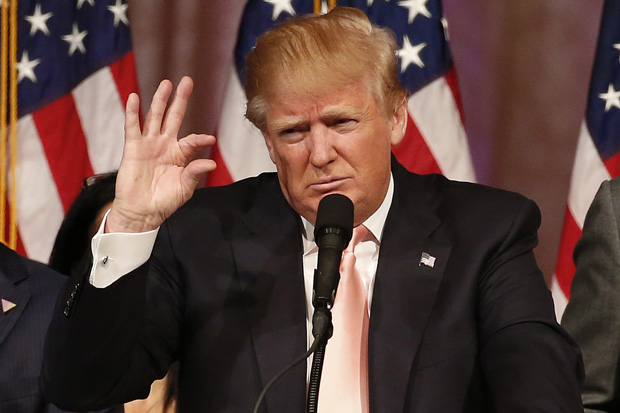If the Republican party were a company, it would now file for bankruptcy. Donald Trump, arguably the most grotesque candidate ever to have run for the Oval Office, seems certain to be the party’s presidential nominee. The former favourite, Marco Rubio, lost in his home state of Florida on Tuesday and has now bowed out of the race. After seven years of deeply unimpressive government from a divisive and ineffectual Democratic president, American conservatism has been unable to offer voters a convincing alternative.
A candidate as flawed as Hillary Clinton should be easy to beat. But the best the Republicans seem able to do is send a dodgy businessman-cum-reality TV star whose political ideas stretch no further than the diatribe of a shock jock and whose first instinct when faced with any kind of challenge is to insult his opponent. Anyone trying to compare Donald Trump to Ronald Reagan should watch recordings of Reagan’s TV debates with George H.W. Bush and Jimmy Carter in 1980. Unfailingly, Reagan gave intelligent answers where Trump would have lashed out at the nearest convenient figure.
The Republicans now face an impossible choice: accept that the party has effectively been destroyed by a madcap tycoon, or seek to stop him becoming its nominee by using skulduggery at its convention in July. Party conventions can, in theory, become contests rather than coronations. This happened in 1976, when the never-elected President Gerald Ford fought off a strong challenge from Reagan. And there’s a case for holding another vote: Trump hasn’t won a majority of votes in any of the states he has won.
There is talk of drafting in previous losers such as Mitt Romney or Paul Ryan to save the party from Trump. But this sounds like fantasy. Both have said they’re not interested; neither would be likely to beat Clinton. Either one might offer the Republicans a mildly less embarrassing form of defeat, but so would any American picked at random from a telephone directory.
The prospect of Trump vs Clinton rightly makes the world shudder. America is an ingenious nation of 300 million which leads the world in science, academia, entertainment, technology and more. But it is unable to find two decent candidates to run for the highest office in the land.
Trump’s nomination was not inevitable, but the failures of the Republican elite made it so. First they tried to usher in a dynastic succession by backing another member of the Bush family. Then, when Jeb Bush proved a disaster, they turned to the 44-year-old pretender Marco Rubio. He has blundered his way to oblivion — making embarrassing jokes about the size of Trump’s hands, for instance — but he stayed in the race for so long that Ted Cruz, the only man who has shown himself able to beat Trump, is now almost certainly too far behind to win.
The party hierarchy never wanted Cruz anyway. Senator Lindsey Graham said choosing between Trump or Cruz was a choice between being ‘shot or poisoned’. They can still try to insist that those who voted for Trump do not represent the will of the party — but this would mean effectively divorcing a third of the party’s supporters. Block Trump and he will surely run as an independent — taking many of his admirers (and quite a few Democrats) with him. He’d still lose, but so would the Republican party. Of the latest 28 national polls, 24 suggest America has already decided to hold its nose and vote Clinton, by a hefty margin.
But the political climate that has brought about the rise of Trump is not a uniquely American phenomenon. Across the world, people’s priorities are changing — and most political establishments are failing to change with them. A fear of populists has blinded prime ministers and presidents to the concerns of voters who support populist parties. Last weekend, Angela Merkel’s Christian Democrats lost votes to a far-right party whose co-leader Frauke Petry has adopted language far worse than that of Donald Trump. Petry suggests migrants crossing the border illegally should be shot. The National Front in France, the Danish Peoples’ Party and others are also rising: centrist parties are losing crucial votes to the extremes.
It isn’t that many voters want migrants shot, or that they wish other unappealing policies to be adopted; it is more that they wish to protest against a remote elite. And those who consider Britain immune to this malady should ask why Scotland has become an SNP one-party state, or why Jeremy Corbyn is leading the Labour party. The Tories were saved because David Cameron wisely called in Sir Lynton Crosby to counter his elitist tendencies with a down-to-earth message. But after he left, the Tories once again started to lose coherence and focus.
The lesson for Republicans — as well as all centrist parties — is that good communicators with clear ideas can win elections, but party-machine candidates running on little more than their own biography flounder. Trump has ended up running away with the Republican nomination not because he is a credible candidate but because he is the one who seems to recognise that the people are the boss. How sad for America that his rivals were unable to do the same.
Got something to add? Join the discussion and comment below.
Get 10 issues for just $10
Subscribe to The Spectator Australia today for the next 10 magazine issues, plus full online access, for just $10.
You might disagree with half of it, but you’ll enjoy reading all of it. Try your first month for free, then just $2 a week for the remainder of your first year.














Comments
Don't miss out
Join the conversation with other Spectator Australia readers. Subscribe to leave a comment.
SUBSCRIBEAlready a subscriber? Log in